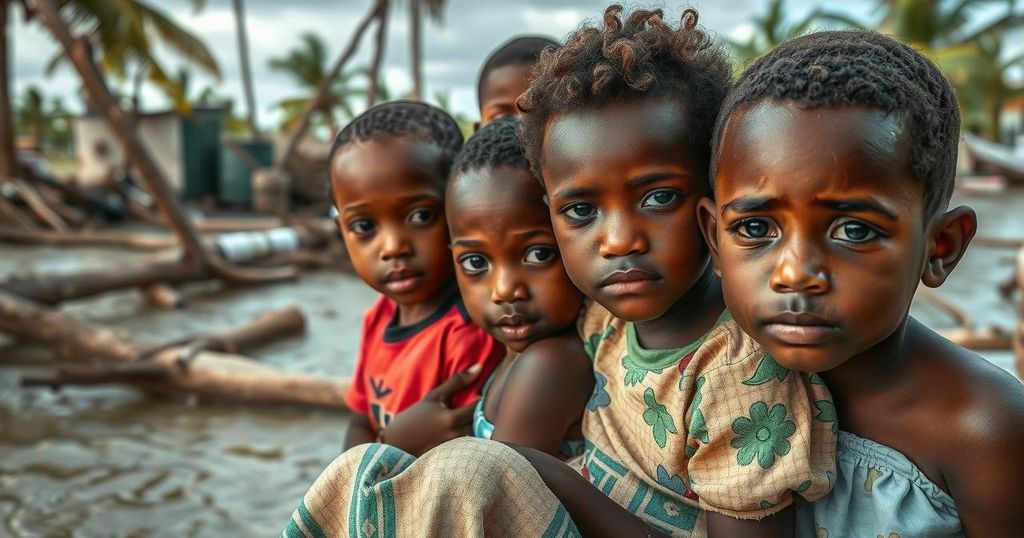Tropical Cyclone Chido Devastates Mozambique, Impacting 90,000 Children
Tropical Cyclone Chido has wreaked havoc in northern Mozambique, affecting around 90,000 children and destroying thousands of homes. The storm amplified existing challenges in a region already facing conflict, drought, and health crises. UN agencies are responding with urgent humanitarian assistance, although they face logistical hurdles in delivering support. The situation requires ongoing attention to prevent further deterioration among the affected populations.
Tropical Cyclone Chido has recently struck northern Mozambique, significantly impacting the Cabo Delgado province and resulting in severe consequences for local communities. Current UN assessments indicate that over 90,000 children have been affected by the storm, which has destroyed or damaged more than 35,000 homes and displaced thousands of families. The cyclone made landfall near the city of Pemba, causing extensive damage to infrastructure, including at least 186,000 classrooms and 20 health facilities.
The situation remains dire as the storm has compounded existing adversities, with Mozambique already grappling with the effects of climate change, conflict, drought, and disease outbreaks. UNICEF Representative in Mozambique, Mary Louise Eagleton, stated, “Mozambique is considered one of the most affected countries in the world by climate change and children were already experiencing several life-threatening emergencies before Cyclone Chido.”
Cabo Delgado has been plagued by conflict for seven years, displacing over 1.3 million individuals, which intensifies the struggle for those who faced renewed hardships due to the cyclone. In addition to Cabo Delgado, the cyclone also caused damage in Nampula and Niassa provinces, leaving approximately 25,000 families without electricity and damaging vital water facilities. With an ongoing cholera outbreak in the region, UNICEF warns that the response to the latest devastation is crucial to avert further health crises.
Efforts to provide immediate assistance are underway. The UNHCR reported that within 48 hours of the cyclone, more than 2,600 individuals in Pemba received emergency relief, including essential supplies such as blankets and shelter materials. According to UNHCR spokesperson Eujin Byun, “Preliminary assessments suggest that around 190,000 people urgently need humanitarian assistance.”
The UN Secretary-General António Guterres announced on social media that UN teams are actively delivering emergency assistance and are prepared to offer further support as the situation demands. However, limited supplies have hindered relief efforts, prompting the allocation of $4 million by the UN’s Emergency Relief Coordinator Tom Fletcher to support the initial humanitarian response. The World Food Programme (WFP) has indicated its intention to scale up efforts to aid those most affected by the cyclone amidst widespread food insecurity projected for the upcoming year.
Cyclone Chido also wreaked havoc in Mayotte, a French overseas territory, as well as in southern Malawi, where strong winds and rains led to significant damage. Monitoring of the situation continues, with local partners coordinating response efforts in affected areas.
The article discusses the severe impact of Tropical Cyclone Chido on northern Mozambique, particularly focusing on the Cabo Delgado province, which has faced both natural disasters and ongoing conflict. Agencies such as UNICEF and UNHCR are assessing the damage and providing essential support to the affected populations, particularly children who have been critically impacted by the cyclone. The situation reflects broader concerns regarding climate change and food insecurity in the region, necessitating urgent humanitarian assistance and coordinated response efforts to manage the crises exacerbated by the cyclone.
In conclusion, Cyclone Chido has devastated northern Mozambique, particularly impacting children and families in Cabo Delgado. With significant destruction of infrastructure and ongoing health crises, the need for urgent humanitarian assistance is critical. UN agencies and local partners are mobilizing to address immediate needs, yet challenges persist due to resource limitations. Continued support is essential to aid recovery and prevent further deterioration of the situation in the region.
Original Source: news.un.org




Post Comment